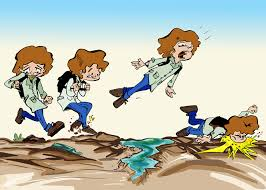3.3 Present tense of tener and other expressions of tener
The verb tener ,which means to have or to posses, is an irregular -er verb. Note how in the first person, the verb ends in go. This irregularity makes the entire verb an irregular verb.
| Yo | tengo |
| Tú | tienes |
| El, ella, usted | tiene |
| Nosotros, nostras | tenemos |
| Vosotros, vosotras | tenéis |
| Ellos, ellas, ustedes | tienen |
Yo tengo muchos amigos. I have a lot of friends.
Nosotros tenemos tarea. We have homework.
The verb tener + que + infinitive
One of the special, idiomatic uses of tener is with the conjuction que plus an infinitive to express the idea of to have to (do something). Make sure to always conjugate tener when using this type of idiomatic expressions.
Vosotros tenéis que estudiar. You have to study.
Ellos tienen que ir a clase a las tres de la tarde. They have to go to class at three in the afternoon.
Other expressions of tener
As mentioned above, the verb tener means to have or to posses, but there are certain expression in the Spanish language that use tener. There are other common expressions that use tener where English uses the verb to be. Note that many of these refer to things we might feel, such as hunger, thirst, cold, etc. Here are some illustrations on these type of expressions.
Here are the most common expressions of tener.
 El tiene calor
|
 El tiene mucho frío
|
 Sleepy tiene sueño. |
 Marcos tiene hambre. |
 Ellos tienen mucha sed. |
 Ella tiene miedo. |
 El conejo blanco tiene prisa. |
 El niño no tiene cuidado. |
 El juez no tiene razón. |

